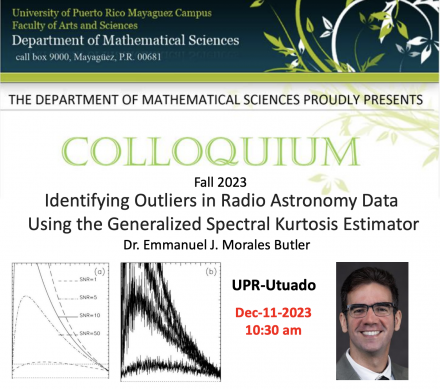Abstract:
As innovation and technologies associated with man-made transmissions progress, complex and new challenges emerge in radio astronomy due to Radio Frequency Interference (RFI). Hence, novel development of software and hardware to detect and mitigate its effects on scientific data are paramount. In this talk we will discuss the successful implementation of the Generalized Spectral Kurtosis Estimator, a statistical tool with great propensity for performing RFI detection and excision. We demonstrate the effectiveness of this technique using radio astronomical spectroscopic data from the 12 meter telescope at the Arecibo Observatory. Specifically, we employ this procedure on two case studies: a 1$^\circ$ by 1$^\circ$ map of the Milky Way’s galactic center and a single-pointing observation on the Rho Ophiuci star-forming nebula. We observed these objects in molecular emission using the 3.3 GHz transitions of Methylidyne (CH), which sit in the midst of a radio frequency band fraught with RFI commonly attributed to such devices as mobile phones and wireless internet routers. Thus, the procedure we present is applied to multiple types of RFI with a range of characteristics, and represents both a significant step forward in salvaging RFI-damaged astronomical data as well as a more widely useful outlier detection framework for other scientific disciplines in which data is frequently gamma-distributed.
Location of the event: FISICA-B

